
At a pre-trial hearing on Wednesday, lawyers for PFC Bradley Manning submitted a motion requesting that 10 of the 22 charges against their client be dropped.
Specifically, Manning’s legal team argued for dismissal of eight specifications of having violated the Espionage Act, as well as two charges of exceeding authorized access.
Manning’s attorneys previously petitioned the military judge presiding over their client’s court martial to drop other charges facing Manning that they claimed were duplications. That motion was denied.
The request to drop the eight counts of illegal transmission of classified information in violation of the Espionage Act is based on the defense’s argument that the intent of the Espionage Act was not to include “this kind of conduct.” Manning’s lawyers insist that these charges in particular are void for being vague and overbroad. The government, they argue, is using these catchall charges in order to criminalize what otherwise amounts to protected free speech.
In what is described as “the biggest leak of classified information in U.S. history,” Manning is accused of passing over 700,000 documents and video clips to WikiLeaks, the widely known website devoted to exposing government corruption throughout the world.
If convicted of the charge of giving aid to the enemy, Manning could face life imprisonment. The maximum penalty for the other charges he faces is 150 years combined.
Manning’s defense team avers that their client was “troubled” and that he was not competent to have been allowed access to classified information.
Private Manning, 24, from Crescent, Oklahoma, has been detained since he was arrested on May 29, 2010 while on deployment with the 10th Mountain Division in Iraq. While on duty near Baghdad, Manning had access to the Secret Internet Protocol Router Network (SIPRNet) and the Joint Worldwide Intelligence Communications System. SIPRNET is the network used by the United States government to transmit classified information.
Manning’s arrest came as the result of information provided to the FBI by a computer hacker named Adrian Lamo. Lamo told agents that during an online chat in May 2010, Manning claimed to have downloaded classified information from SIPRNet and sent it to WikiLeaks.
According to published reports, the material Manning is accused of unlawfully appropriating includes a large cache of U.S. diplomatic cables (approximately 250,000), as well as videos of an American airstrike on Baghdad conducted in July 2007 and a similar attack in May 2009 on a site near Granai, Afghanistan (an event sometimes known as the Granai Massacre).
In his defense, Manning’s lawyers argued that Manning was not the only one in his unit with access to the computers from which the information in controversy was obtained. As reported by the Associated Press:
They say he was in emotional turmoil, partly because he was a gay soldier while U.S. armed forces still barred gays from serving openly. The defense also claims Manning’s apparent disregard for security rules during stateside training and his increasingly violent outbursts after deployment were red flags that should have prevented him from having access to classified material.
The prosecutors also disclosed printed copies of excerpts of Internet chats found on Manning’s personal computer. According to the Army, these transcripts prove Manning’s collaboration with the founder of WikiLeaks, Julian Assange.
Regarding the supposed damage to national security caused by the WikiLeaks publication of the documents allegedly provided to it by Manning, the accused’s legal team scored a rare victory on Wednesday.
At the hearings being conducted at Ft. Meade, Maryland, Judge Lind ordered the government to give the defense a cache of confidential documents related to the WikiLeaks website that it was previously withholding.
Per the judge’s order, lawyers for the Obama administration must now turn over to David Coombs, Manning’s chief civilian defense counsel, some of the damage assessment reports it compiled of estimates of the impact of the WikiLeaks publication on the international interests of the United States.
The defense hopes that information revealed in these files will bolster its case by demonstrating that the effect of the leaks was minimal and did not rise to the level of giving aid to the enemy.
The State Department conducted much of the investigation into the impact of the WikiLeaks publication of information allegedly provided by PFC Manning. Its report on this inquiry was among the documents received by Coombs and his colleagues as a result of the judge’s ruling.
Although the information has been released to Manning’s lawyers it will not be released to the public. Regardless of the secrecy, it is believed that the file includes reports submitted by American embassies around the world regarding any negative impact on their ability to carry out their missions in the wake of WikiLeaks’ release of thousands of cables exchanged among the diplomatic corps.
Though the information has not been made public, it is likely to include the assessments of embassies across the globe of the effects on their work of the publication of hundreds of thousands of diplomatic cables.
According to various reports as to the information contained in the remainder of the documents, a summary report of the results of the investigation into the matter conducted by the FBI, as well as a redacted report filed by the Defense Intelligence Agency, are believed to be included.
In November 2010, U.S. Attorney General Eric Holder condemned WikiLeaks for its publication of confidential information, saying that it threatens U.S. national security, specifically by risking the safety of those serving the country and straining important diplomatic relationships.
WikiLeaks has alleged the information must be revealed to the public as evidence of potential crimes against humanity. In July 2010, WikiLeaks founder Julian Assange said that the Afghan War Diaries, a compilation of 91,000 documents leaked to the organization on the U.S. war effort in Afghanistan, may provide evidence of war crimes committed by U.S. forces.
As to whether the Attorney General’s opinion is valid, there is very little to go on as the government has kept a lock and key on every one of its motions, responses to defense briefs, or filings in the case beyond the initial charges — even in redacted form. No transcripts of any proceedings in the case have been published — even for proceedings that occurred in open court. Nor have any orders of the Court been published.
The government has not provided — and cannot provide — any legal basis for withholding these documents from the public. Nor does it appear that the Court made any of the requisite findings that could support closing these proceedings or denying access to the documents at issue, or provided notice of such envisioned closures and opportunity to object to the press and public.
For what purpose, then, is the Obama administration stonewalling the media and denying access to the official record of the military tribunal trying Bradley Manning?
According to one report, the White House insists that the documents allegedly released by Manning pose a serious threat to American national security and thus the trial transcripts must be protected in order to prevent increasing the threat. Whether such an assertion is true or not, however, is impossible to discern given the paucity of proof provided by the President.
Regarding this secrecy, David Coombs “protested that whenever he asked the government for specific information he was told he was being too broad.”
Additionally, Coombs described for the press the struggle he was having in trying to obtain documents related to a review carried out by the House Oversight Committee. Mentioning the Committee Chairman Darrell Issa (R-Calif.), Coombs said, “Short of telling the government that the documents are in a red file in Darrell Issa’s third drawer, beneath his Bible, you can’t get much more specific than my request.”
PFC Manning has not entered a plea in the case, nor has he decided whether he wants a bench or jury trial. According to applicable rules of military legal procedure, Manning has until the first day of trial to make these decisions. The trial is set to begin on September 21.
Photo: Army Pfc. Bradley Manning, right, is escorted from a security vehicle outside a courthouse in Fort Meade, Md., June 7, 2012, for a pre-trial hearing: AP Images




